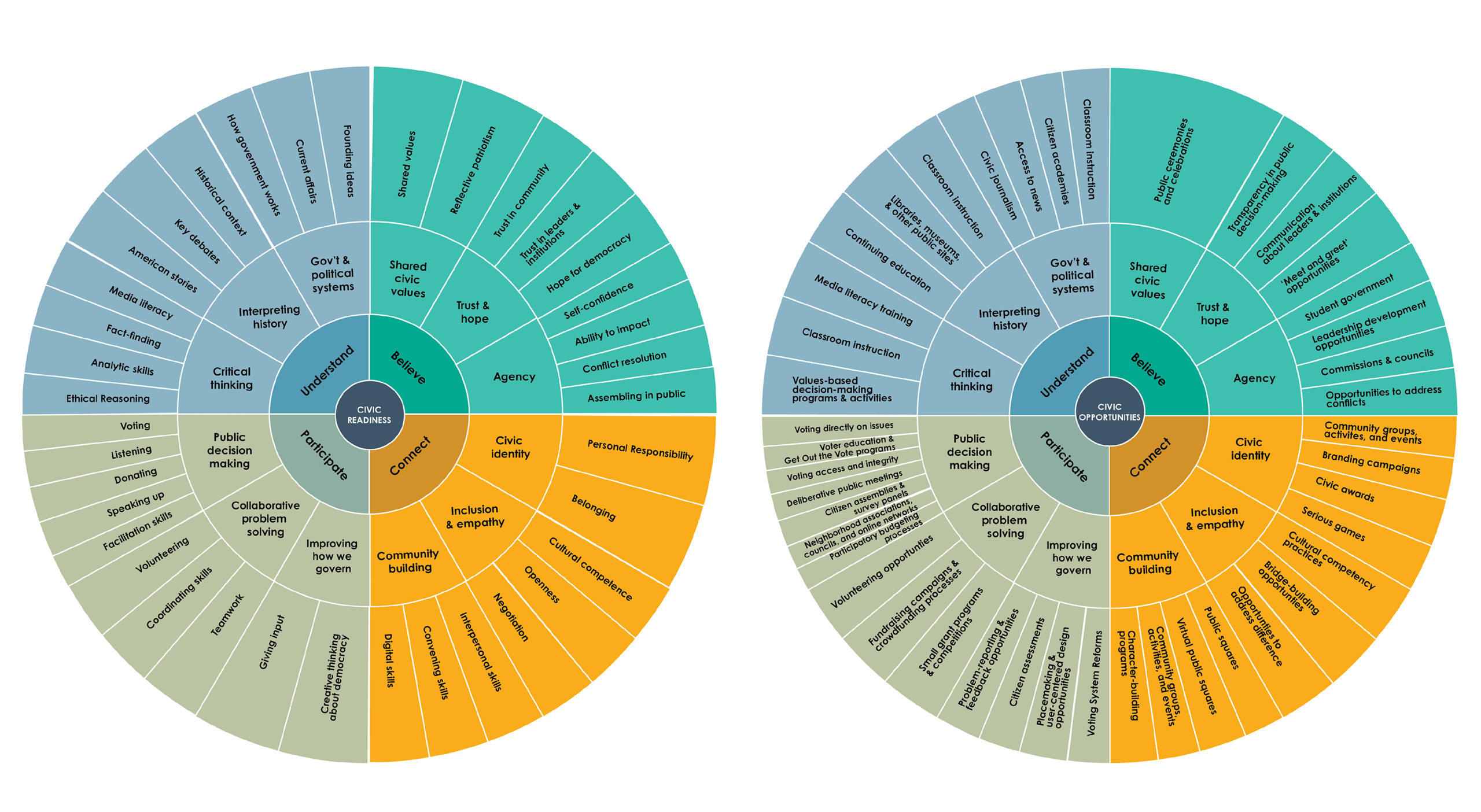Share
As the next election cycle looms, what do we, as civic learning practitioners, hope to see? In addition to seeing an increase in voter participation, we hope Americans do that with pride, as a civic duty. We hope our fellow citizens, who may be tired of partisan one-upmanship, still participate in elections and believe their vote matters. Maybe some of us are just trying to make it to the voting booth on a busy day.
We hope to reach all citizens with our work and as a sector place a lot of emphasis on voting. It is, after all, viewed as a hallmark of civic engagement. But do we inadvertently undervalue the many other factors that go into the single act of casting a ballot?
Our recent report Mapping Civic Measurement: How are we assessing readiness and opportunities for an engaged citizenry? included a first-of-its-kind framework for mapping how individuals ready themselves for civic participation as well as the opportunities they have to express that readiness. In a sense, we looked at what researchers are measuring when they think about a “healthy democracy.”
The resulting framework turned out to be much richer than we initially expected. A key reason why: what individuals do to be “good citizens” involves much more than any one field of study is measuring.

Our mapping exercise revealed that voting dominates the focus of researchers studying civic engagement. Given how often we hear “make sure you vote,” this may not be a surprise. It’s also not a surprise from a research standpoint. Voting is relatively easy to measure (i.e. it happened or it didn’t—although, for some, even that is controversial these days). There are partisan reasons for wanting to know what turnout looks like. Voting is also something that happens at scale, all at once.
By focusing so much on the vote, what may we, as civic learning practitioners, be unintentionally undervaluing? Think about what leads up to casting the ballot. Did you grow up in a family for whom voting was important? Do you have friends who care about politics? Did you hear information that made you vote for or against a candidate? All the precursors that informed and influenced the singular vote are worth understanding better if we as a field care about increasing voter participation.
Related: Mapping Civic MeasurementThere’s the many other factors you see on the two maps we’ve produced. Some examples: what about media literacy, reflective patriotism, trust in institutions, conflict resolution skills, negotiation or shared values? Do these play a role in how well America is functioning as a constitutional democracy?
My own answer is “yes, of course.” This was also the answer from the more than 70 people we engaged on the Mapping Civic Measurement report.
If we know it’s more complicated than voting, how can we make sure we’re studying and investing resources into the more complicated, harder to assess stuff? That’s one of the fun questions we’re getting to work on in the next various phases of this measurement project. There are lots of highly talented researchers thinking about this. Let’s help them find richer answers to the question on all of our minds: “Is America going to be okay?”
And here too, my own answer is “yes, of course.” Projects such as our collaborative measurement work will help check my premise.
Debi Ghate is an executive fellow with the Institute for Citizens & Scholars, and co-author of Mapping Civic Measurement: How are we assessing readiness and opportunities for an engaged citizenry? She is president of Steadfast as well as vice president of partnerships at The Center for the Rights of Abused Children, executive fellow at the State Policy Network, and initiative director for the George Mason University’s “Voices for Liberty: Free Speech, Civil Rights and Social Progress” program.
Debi is a trained lawyer, previously practicing civil litigation in Ontario, Canada before moving to California to join the Ayn Rand Institute. At the Institute, she oversaw the education and policy programs before serving on leadership teams at two Foundations, including the Charles Koch Foundation and the Anthem Foundation for Objectivist Scholarship. She was previously the senior director of grant strategy at The Snider Foundation and most recently the vice president of strategy and programs for Philanthropy Roundtable. Debi serves on the boards of Americans for Fair Treatment, Anthem Foundation for Objectivist Scholarship, Empire Center for Public Policy, FAMM, and the Government Justice Center. She received a bachelor of science in Psychology, Biology and French at the University of Toronto and a bachelor of laws at the University of Calgary.
Stay Engaged
Get More News
Join our mailing list to get more news like this to your mailbox.
Support Our Work
Help us invest in the talent, ideas, and networks that will develop young people as effective, lifelong citizens.
Ways to Support Us